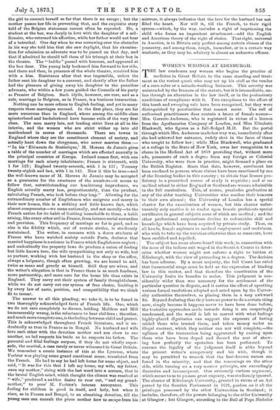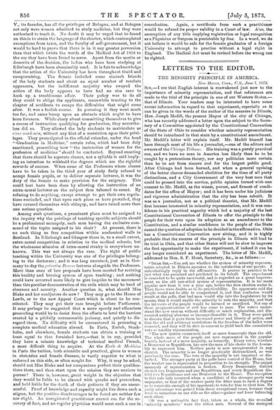WOMEN'S WRONGS AT EDINBURGH.
Tim law condemns any woman who begins the practice of medicine in Great Britain to the same standing and treat- ment as the veriest quack who may set up his stall as the vendor of a corn-salve or a miracle-working liniment. This severity was unintended by the framers of the statute, but it is irremediable, un- less through an alteration in the law itself, or in the preliminary conditions of compliance with it. Two exceptions to the effect of this harsh and sweeping rule have been recognised, but they were distinguished by peculiarities that cannot recur. The roll of authorised practitioners does contain a brace of female names— Mrs. Garrett-Anderson, who is registered in virtue of a licence from the Apothecaries Company of London, and Miss Elizabetk Blackwell, who figures as a full-fledged M.D. But the portal through which Mrs. Anderson made her way was, immediately after she had achieved her entrance, rudely shut in the faces of those who sought to follow her ; while Miss Blackwell, who graduated at a college in the State of New York, owes her recognition to a clause in the Medical Act of 1858 providing that, without more ado, possessors of such a degree from any foreign or Colonial University, who were then in practice, might demand a place on the British Register. Since that date, however, enrolment has been confined to persons whose claims have been sanctioned by one of the licensing bodies in this country ; to obtain that licence pro- ficiency in a prescribed course of study is requisite ; and at no medical school in either England or Scotland are women admissible to the full curriculum. This, of course, precludes graduation at any of the older teaching Universities who confine their honours to their own alumni ; the University of London has a special charter for the examination of women, but this charter unfor- tunately only enables it to confer upon female proficients special certificates in general subjects none of which are medical ; and the other professional corporations decline to enfranchise skill and knowledge which have been acquired by private study. Thus, on all hands, female aspirants to medical employment and usefulness, who wish to take up the vocation otherwise than as amateurs, have been snubbed and repelled.
The subject has come above-board this week, in connection with the issue of the tedious suit waged in the Scottish Courts to deter- mine whether women might not enforce a right to tuition at Edinburgh, with the view of proceeding to a degree. The decision has been adverse. By a scant majority, the full Court has ruled that immemorial usage must be held as the expression of binding law in this matter, and that therefore the constitution of the University limits its benefits to males. This judgment is con- siderably wider than was necessary for the settlement of the particular question in dispute, and it carries the effect of upsetting various formal resolutions adopted and acted upon by the Univer- sity authorities themselves, so placing them in a very awkward fix. Beyond declaring that they have no power to do a certain thing now, simply because it happens never to have been done before, the tentative approaches made towards doing it are unsparingly condemned, and the world is left to marvel with what feelings highly-placed dignitaries can support the exposure of having misled those who trusted them, and taken money under an illegal contract, which they neither can nor will complete,—the ugliness of the transaction being aggravated by casting upon those who have been duped and fleeced the cost of show- ing how perfectly the operation has been performed. To canvass the legality of the judgment itself is alike beyond the present writer's competency and his wish, though it may be permitted to remark that the best-known names are found in the minority, and that the reasonings on the other side, while turning on a very narrow principle, are exceedingly discursive and inconsequent. One extremely curious argument, which seems to us to possess great cogency, was studiously ignored. The charter of Edinburgh University, granted in virtue of an Act passed by the Scottish Parliament in 1621, confers on it all the privileges possessed by the other Universities in Scotland ; it includes, therefore, all the powers belonging to the older University at Glasgow ; but Glasgow, according to the Ball of Pope Nicholas
V., its founder, has all the privileges of Bologna, and at Bologna not only were women admitted to study medicine, but they were authorised to teach it. No doubt it may be urged that to found on this is to strain the language of the charter, which contemplated exemptions from taxes, and the faculty of self-government, but it would be hard to prove that there is in it any greater perversion than that which twists the words of the Medical Act of 1858 to the use they have been found to serve. Apart from the merits or demerits of the decision, the ladies who have been studying at Edinburgh have been abominably used. It is fair to acknowledge that the action of the University has been throughout timid and compromising. The Senate included some staunch friends of the lady students and about an equal number of resolute opponents, but the indifferent majority who swayed the action of the body appears to have had no aim save to hush up a troublesome affair. 'Their policy was to do all they could to oblige the applicants, meanwhile trusting to the chapter of accidents to escape the difficulties that might come after. It was a foolish course. In pursuing it they went much too far, and came bump upon an obstacle which ought to have been foreseen. While chary about committing themselves to give a course of instruction qualifying for graduation, they neverthe- less did so. They allowed the lady students to matriculate as cives acadenzim, without any hint of a restriction upon their privi- leges. They promulgated in the official calendar, under the head "Graduation in Medicine," certain rules, which had been duly sanctioned, prescribing how "the instruction of women for the profession of medicine" should be conducted. Beyond enacting that there should be separate classes, not a syllable is said imply- ing an intention to withhold the degrees which are the rightful rewards of success. When some of the Professors whose classes have to be taken in the third year of study flatly refused to accept female pupils, or to deliver separate lectures, it was the duty of the Senate to make provision for the exigency. This could best have been done by allowing the instruction of an extra-mural lecturer on the subject thus tabooed to count. By refusing to do anything, except attempt to get their own regula- tions rescinded, and that upon such pleas as have prevailed, they have covered themselves with obloquy, and have raised more than one serious question.
Among such questions, a prominent place must be assigned to the inquiry why the privilege of teaching specific subjects should be a professional monopoly, each man having the exclusive com- mand of the topics assigned to his chair ? At present, there is no such thing as free competition within academical walls in Scotland. In Edinburgh and Glasgow there is, to a small extent, extra-mural competition in relation to the medical schools, but the wholesome stimulus of intra-mural rivalry is everywhere un- known. This was not always the case. The right of public teaching within the University was one of the privileges belong- ing to the doctorate; and it was long exercised, just as in Ger- many to-day the privatint Thcens lectures alongside the Professors. More than once of late proposals have been mooted for reviving this healthy and bracing system of open teaching ; and nothing could have occurred more likely to give impulse to the movement than this peculiar demonstration of the evils which may be bred of closeness and security. Another question is, what should Miss Blake and her coadjutors do now ? They may go to the House of Lords, or to the new Appeal Court which is about to be con- stituted. They may get their case brought before Parliament. It may perhaps be suggested that a more speedy and efficacious proceeding would be to desist from the efforts to level the barriers erected by a pitifully unreasonable jealousy, and quietly to dis- regard them. No difficulty will be encountered in procuring a complete medical education abroad. In Paris, Zurich, Stock- holm, and elsewhere, female students can obtain a training at least equal to that furnished here,—that is to say, provided they have a minute knowledge of technical medical French, a most difficult thing to acquire. At the Ecole de Medicine in Paris the tuition, both scientific and practical, given to women in obstetrics and female diseases, is vastly superior to what is enforced on this side, or often sought for. Why, it may be asked, should not Miss Blake and her companions perfect their qualifica- tions there, and then start upon the mission they are anxious to pursue? There is, however, great weight in the objection that they would be liable to be classed with quacks and pretenders, and held liable for the death of their patients if they are unsuc- cessful. Proof of knowledge and capacity might live down such a stigma, but the positive disadvantages to be faced are neither few nor slight. An unregistered practitioner cannot sue for the re- covery of fees, and no regular physician would meet such a one in consultation. Again, a certificate from such a practitioner would be refused its proper validity in a Court of law. Also, the assumption of any title implying registration or legal recognition as a Physician or Surgeon is punishable by fine. In a word, we do not believe it would be safe for the female graduates of a foreign University to attempt to practise without a legal right in England. The Medical Act must be revised before the wrong can be righted.



































 Previous page
Previous page